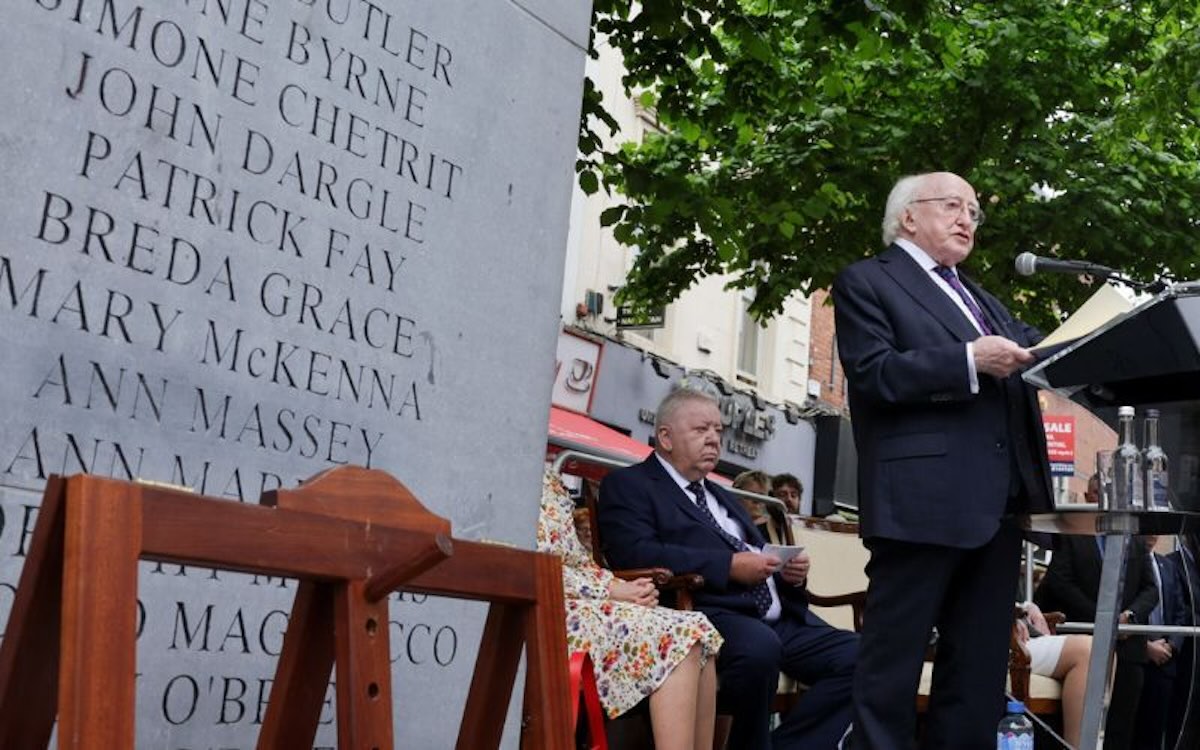
The Irish President Michael D Higgins has dramatically spoken out against the continuing cover-up of the Dublin and Monaghan bombings on the 50th anniversary of the massacre, which killed 34 people and injured almost 300.
Speaking to over a thousand people at the largest memorial event in recent years, he said it was a “matter of profound regret” and “unacceptable” that no one had been held accountable.
He spoke out in the same month new British legislation to terminate investigations and inquests into conflict-related killings, including a full impunity for British forces involved in war crimes.
On 17 May, 1974, three bombs were set off in Dublin and one in the town of Monaghan by unionist paramilitaries acting in concert with members of the British Crown Forces.
It was the largest loss of life on any single day of the conflict.
Nobody was ever convicted, and Mr Higgins condemned what he said was a “manifest failure” to investigate the worst bombing in the country’s modern history.
The President said both the London and Dublin governments had failed to “initiate suitable responses in the aftermath of the attacks”.
He also said there were systemic failures at state level including overt collusion, the disappearance of important forensic evidence and a refusal to supply information.
The President said there must be a “clear account of the context, the information shared and the knowledge as to preparations for what happened to and caused the death and injuries” during the bombs.
He noted that earlier this week the Dublin parliament called for the fourth time for all documents held by the British government in relation to what happened to be released.
He said that the people of Ireland “stand in solidarity” with the families and loved ones of the Dublin-Monaghan bombings.
The pain caused by what happened has been added to by “the long wait for information on those tragic events”, Mr Higgins said.
He added that “unanswered questions remain”, and that providing answers should be “a basic right by any standard of justice”.
“Like the families of so many other victims and survivors of the Northern Ireland conflict, so many of you here today have been trying to find answers about what happened,” he said.
Referring directly to Britain’s ‘Legacy Act’ cover-up, he said it was “not morally acceptable, nor is it politically feasible” to ask those affected by the conflict to forget the past.
“We share, on this island and beyond, a collective responsibility to find a way to deal ethically with the legacy of the Troubles,” he added.
“A strategy of feigned amnesia, or hoping time will deliver one is simply not an option, nor is any strategy of continuing the protection of previous evasions or failures to act.”
He added: “I share with the relatives gathered or represented here their feeling of being abandoned and failed by the system, of their being denied justice for the loss of loved ones.”
Mr Higgins said the families need “more than an empathetic ear” and “justice demands that they deserve the truth, no more, no less”.
In Monaghan, over a thousand people who took part in an outdoor service heard the bell of St Patrick’s Church ring at the precise moment the bomb exploded fifty years ago.
The President also laid a wreath at the monument for the seven people who lost their lives in the bombing in Monaghan town. Sharon Askin, whose father Paddy was killed in the bombing, read out the names of all those murdered in both locations.
Speaking out ahead of the anniversary, former Irish Taoiseach Bertie Ahern said former British Prime Minister Tony Blair had privately confirmed to him that MI5 and MI6 are “probably” withholding information on the bombings.
He joined calls on the British state to release all information about the massacres.
Although the loyalist Ulster Volunteer Force (UVF) admitted responsibility in 1993, no-one has ever been convicted.
A high-profile British policing operation is supposedly investigating the activities of the ‘Glenanne Gang’ which carried out the bombings,
The head of that investigation has admitted that collusion was involved, but has so failed to release any further information.
The 26 County Tánaiste, Michéal Martin, again pledged that all files held in Dublin in connection with the bombings would be released, a promise which has repeatedly been made in the past but has never been fulfilled.
Edward O’Neill, 54, was only five when he was caught up in UVF bomb attacks on Dublin and Monaghan. His father was killed and he and his brother were badly injured, causing his mother to miscarry.
He has been part of lengthy legal campaigns to try and force the Irish state to open its files on the atrocity to victims. He believes Garda have covered up the fact they had advance warning of the attack.
Mr O’Neill said Mr Martin’s “pants are on fire”.
“Unfortunately I have had too much experience dealing with politicians,” Mr O’Neill responded.
“This is a sound bite to relieve pressure from the Irish Government on the 50th anniversary. Tomorrow it will be all forgotten, just as the victims have been for 50 years.”
![[Irish Republican News]](https://republican-news.org/graphics/title_gifs/rn.gif)
![[Irish Republican News]](https://republican-news.org/graphics/title_gifs/harp.gif)

